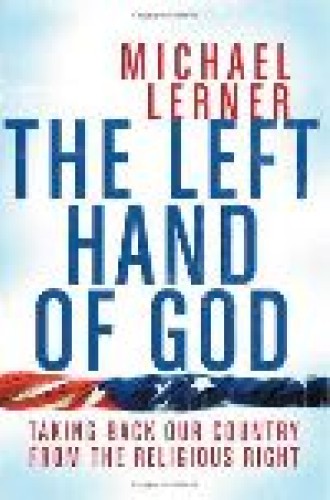Healing the political psyche
Rabbi Michael Lerner, editor of the progressive Jewish magazine Tikkun, understands that a bipolar personality disorder has afflicted our nation. We see everyone and everything in terms of conservative versus liberal, or religious right versus secular left. Whether one prefers the dominant conservative manic euphoria or the subdominant liberal depression, our untreated national neurosis creates an unhealthy situation for ourselves and our relations.
Lerner also understands that what we want and need is to move beyond these extreme mood swings. We need to get to the place where we’re more integrated and balanced. Even liberals would agree, I think, that a liberal mania with a corresponding conservative depression would be a sign not of cure, but merely of another cycle of disease. So to treat our national condition, we have to find constructive ways to talk about it, and that involves naming left and right as two parts of “us” rather than one side being “us” and the other “them.”
Lerner contributes to this healing in a most stimulating way. He suggests that the mind of God has both a right and a left hemisphere, and that God’s goodness expresses itself in a healthy integration of the two. The right hand of God is the muscular hand that reaches out with power to help the weak and oppressed. In biblical terms, the saving strength of God’s right arm reaches into Egypt through Moses, liberates the Hebrew slaves and leads them through the desert. God’s right hand similarly helps the dispossessed to gain a foothold in the land of promise so they have a home where they can “sit under their own vine and fig tree and not be afraid.”
But once the Jewish people are settled in the land, once they become prosperous and build cities and develop a thriving economy and religious life, the equally strong but more gentle left hand of God reaches into society through the prophets, calling the powerful to use their power justly and compassionately on behalf of the vulnerable—the widows, the orphans and the poor.
These themes will, of course, be picked up later by a Jewish prophet whose vision of the kingdom of God integrates an affirmation of God’s care for the “least of these” with a call to the rich and powerful to stop abusing their power and instead to turn in compassion to their needy neighbors. His climactic reappropriation of an old text, “Be perfect as your Father in heaven is perfect,” implies that God’s perfection is balanced, ambidextrous and integrated, not lopsided, reactionary and one-handed like the image of God projected by so many religious establishments, past and present.
The Left Hand of God acknowledges that in the religious as well as political sector of the United States, God’s left hand is being ignored, and God is being worshiped and celebrated as a left-brained being whose right hand is raised in a fist and whose left hand hangs limp and atrophied. Worse, the richest and most powerful nation on earth seeks the right hand of God for more riches and power, so that this hand is now seen as being strong and generous on behalf of the strong and rich, and callous toward the vulnerable and marginalized. Lerner calls for a return to a more sane and biblical balance. He calls for a growing alliance of spiritual progressives who seek to provide a viable alternative to the religious right and the secular left, neither of which, he believes, offers a way ahead.
Lerner does more than diagnose our disease; he also prescribes a treatment plan in the form of a “Spiritual Agenda for American Politics.” I found the chapters on the economy and foreign policy especially effective. Lerner outlines proposals that could be helpful to both Democrats and Republicans who believe that the religious right creates serious new problems even as it tries to solve old ones. Some readers may be put off by his strong—some would say prophetic—critique, but all but the most partisan will find value in his “spiritual agenda.”
The low point of this important book is its subtitle. Although the religious right has indeed taken the country in more ways than one, to use the language of “taking back our country” strikes me as risky. Rallying cries like this may backfire by strengthening us-them dualities and continuing a form of aggressive win-lose discourse, one of the saddest legacies of the culture-war language of the religious right. Lerner acknowledges these very dangers in the book.
We who would follow a healing path must speak boldly, as Lerner does. We must recognize, as he does, that the religious right arose in response to the previous strength of an unhealthy, reductionist secularism. Voices like those of Lerner, Jim Wallis and Jimmy Carter tell us that the religious monologue about faith in the public square is ending. A new dialogue has begun, and all who participate must set a higher goal than stopping the religious right: we must also seek healing from this paralyzing polarization so we can get on with the work of cooperating with God in the making of a better world. That is Lerner’s ultimate goal, and he brings to the effort familiarity with Christian thinkers as well as Jewish ones, and an ability to bring people from diverse traditions to the table—not for a mushy least-common-denominator ecumenism, but for robust dialogue as people speak from the particularity of their faith traditions and commitments.
The Left Hand of God is a provocative invitation to the broad dialogue we need so we can imagine a future better than the one presented by some well-organized religious neoconservatives. Perhaps like a gathering of family members who plead with an ill or addicted daughter or brother to get psychiatric care, this book is a tough-love intervention, calling us to self-examination and to healing for our unhealthy national ethos, in the dynamic tradition of prophetic Jewish voices across the centuries.





